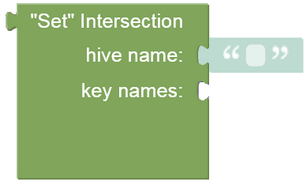Intersection¶
Description¶
This operation finds and returns identical values between two or more sets.
Method¶
POST
Endpoint URL¶
Important
Make sure to replace xxxx in the domain name in the request specification below to the one assigned to your application.
https://xxxx.backendless.app/api/hive/[hive-name]/set/action/intersection
where:
| Argument | Description |
|---|---|
[hive-name] |
Name of a hive where the operation is performed. |
Request Headers¶
Content-Type:application/json
where:
| Argument | Description |
|---|---|
Content-Type |
Must be set to application/json. This header is mandatory. |
Request Body¶
The request body must be a JSON array containing string values that identify the names of the specified sets:
["setname_1", "setname_2", ...]
Response Body¶
A JSON array containing identical values found between the primary set and all consecutive sets included in the operation. Each individual value is of the JSON data type.
Example¶
The example below finds and returns identical values found between the primary set (i.e. "cars") and the secondary set (i.e. "cars_2").
curl --location --request POST "https://xxxx.backendless.app/api/hive/transport/set/action/intersection" \--header 'Content-Type: application/json' \--data-raw '["cars", "cars_2"]'
where:
| Argument | Description |
|---|---|
transport |
Name of a hive where the operation is performed. |
["cars", "cars_2"] |
An array of key names each identifying a set containing multiple values. |
Contents Of Specified Sets

Response
The output will look as shown below after this operation runs. Only identical values found between the primary set("cars") and the secondary set("cars_2") are included in the response.

Codeless Reference¶

where:
| Argument | Description |
|---|---|
hive name |
Name of a hive where the operation is performed. |
key names |
A list containing key names identifying unique sets. |
Returns a list of identical values derived from multiple sets.
Consider the following Set storages:

The example below finds and returns identical values found between the primary set (i.e. "cars") and the secondary set (i.e. "cars_2").
The output will look as shown below after the Codeless logic runs. Only identical values found between the primary set("cars") and the secondary set("cars_2") are included in the response.
